Published Sep 22, 2022
Star Trek and the Magic of Holo-Mentors
A Star Trek fan demystifies the appeal of imaginary and/or fictional counselors and their perspective.
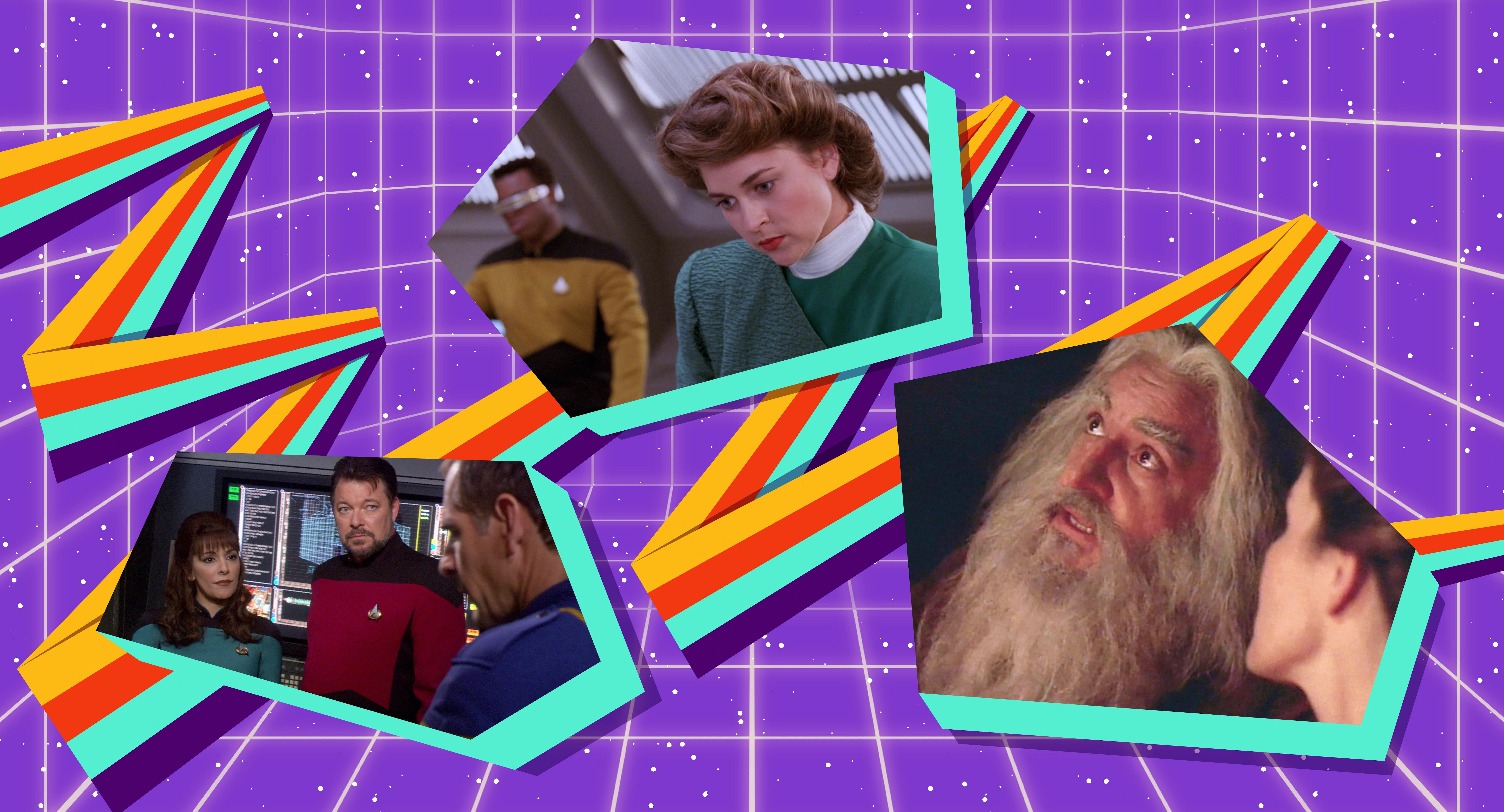
StarTrek.com/Rob DeHart
Holodecks may still be three centuries away in the Star Trek universe, but Elowen Edwards does not feel that we need to wait for any technological breakthroughs to get away from our contemporary troubles. Edwards has always felt connected to the franchise’s characters that she envisions what it would be like to receive their advice on real-world issues.
Initially embarrassed by her creative hobby, her discomfort faded away when she learned how common the use of “imaginary mentors” is in our society. In turn, this discovery prompted Edwards to realize just how often her favorite Star Trek protagonists consulted holographic advisors in the 24th Century. Edwards chatted with StarTrek.com about this familiar method of escapism.
StarTrek.com: Let’s start from the beginning. What prompted you to imagine turning to Star Trek and its characters for advice?
Elowen Edwards: I started making fictional characters part of my life when I was a child. Not Star Trek characters at first, because I was too young, but from all sorts of television series. I was a very imaginative child and I spent hours in my room reading or living my own fantasies, with people I could relate to. I can very much relate to Lieutenant Barclay in the TNG episode “Hollow Pursuits,” particularly when Troi, Riker, and La Forge walked in on his Holodeck program.
Growing older, I continued this childhood habit. I started watching The Next Generation, and later Voyager and Enterprise, with my mum, and the characters stayed with me, much more than those from any other TV series, movie, or book. These were characters living in a world where people strove to be morally good, to do the right thing, to make the world a better place, and promote peace across the whole galaxy. I wanted that world for myself. I wanted these characters as my friends and mentors. I wanted to be like Wesley Crusher.
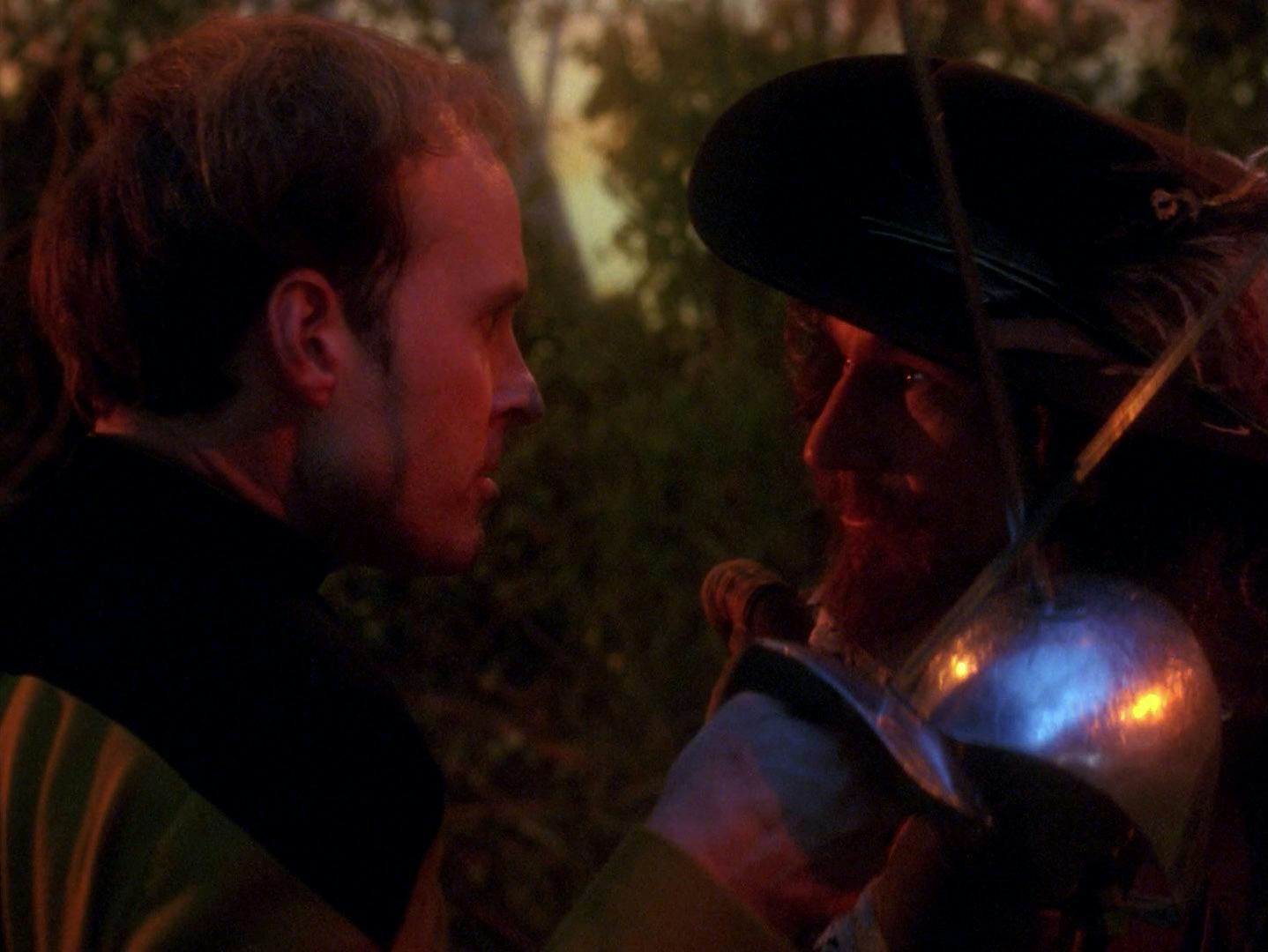
StarTrek.com
StarTrek.com: How did you learn about the widespread use of fictional mentors, and what was your first reaction to discovering you were not alone?
Elowen Edwards: I only found out recently that others did this as well. I was talking to a friend about maladaptive daydreaming, which means that you spend a significant amount of time fantasizing about imaginary worlds rather than the real world. At first I thought that’s what I did too, but then I realized I was actually doing the opposite. Instead of imagining being in another world, I brought the fictional characters to my own, which is comparable to what children do when they have imaginary friends.
I searched the internet and came across an article which described my own experiences almost exactly. Apparently I’m in good company, because Isaac Newton and Machiavelli had imaginary friends, or mentors, too. They imagined having conversations with those they admired, and it helped them think and put their thoughts into words. While this may sound childlike, I am very much aware these characters are fictional. It’s nothing more than a strategy to deal with thoughts, emotions, and everyday life. After reading that article I was quite relieved. As an adult, I’ve come to terms with the fact that some aspects of my way of thinking and of experiencing the world aren’t that universal, but knowing that I’m not alone in my quirks, and also having the tools and the language to think and talk about them is very helpful and comforting.
StarTrek.com: When did you realize that your personal efforts mirrored the manner in which Star Trek characters interact with holographic mentors?
Elowen Edwards: When I finished my recent re-watch of Star Trek: Enterprise with its final episode “These Are The Voyages...” I know that many Enterprise fans dislike the episode, but seeing Riker use the Holodeck to make an important decision was very validating. It reminded me of other episodes where characters use the Holodeck to get a different perspective, advice or guidance. Janeway talks to Leonardo da Vinci, Seven uses the Holodeck to explore her humanity, and Geordi La Forge learns from a holographic version of Dr. Leah Brahms.
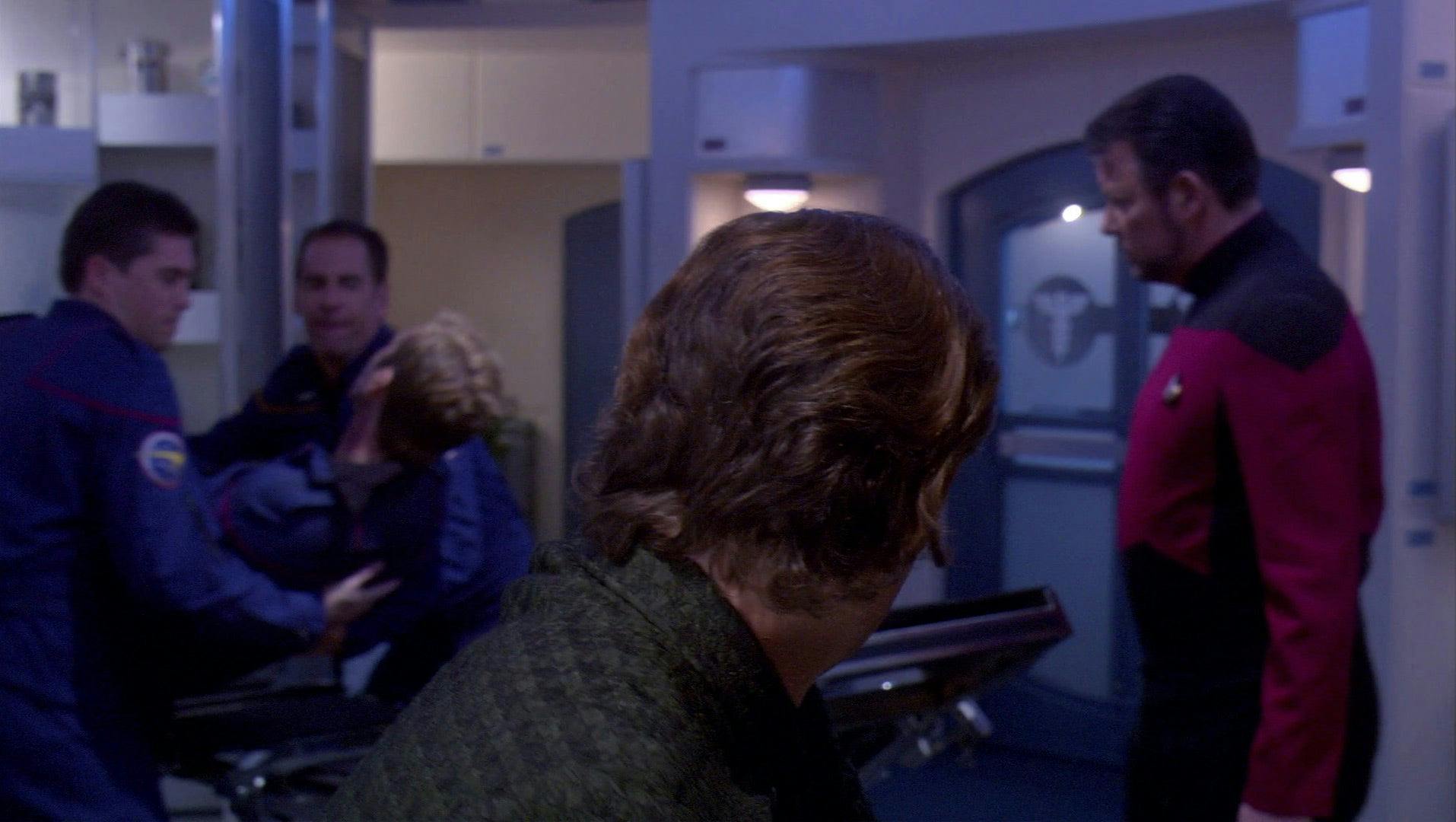
StarTrek.com
StarTrek.com: Which Star Trek characters are you drawn to the most, and what types of problems and issues do you envision yourself discussing with them?
Elowen Edwards: Oh wow, this could become a long list... but I’ll limit myself to my favorites. The very first Star Trek character I was drawn to has to be Spock. Back then I was too young to understand The Original Series, but his calm, logical demeanor made a lasting impression on me. And the ears of course. I’m very much drawn to Vulcans. I’m a pretty logical person myself, but also prone to strong emotional reactions, so it helps to use Vulcan philosophy to control those emotions and rationalize them. I put myself in Michael Burnham’s shoes and imagine what it must be like to be Sarek’s protégée. I absolutely love the relationship between Sarek and Michael Burnham, and also the way Amanda provides the necessary balance when Sarek is too distant or too rigid in his thinking.
Then there are Admiral Cornwell, Captain Janeway, and Deanna Troi. All three are powerful characters in their own way without denying the emotional side of life. Janeway is especially willing to bend, or outright break, the rules when she believes they are stopping her from doing the right thing. And although that might seem against Starfleet philosophy, I think it’s important to always keep in mind that we are responsible for our own actions, regardless of the rules people have made up. History proves that critical thinking is essential in preventing atrocities and catastrophes.
I can’t really think of specific examples of problems or issues I envision discussing with them. It’s more of an internalized thinking process or attitude. It’s like the meme “What Would Janeway Do?,” but instead the question is, “What would I do if I were in Star Trek’s future?” The answer is based on the example provided by Star Trek characters I relate to. It’s a change of perspective.
StarTrek.com: Do you have a favorite episode or scene where a hologram supplies vital counsel to a protagonist in Star Trek?
Elowen Edwards: This is quite an obvious choice, but Janeway talking to Leonardo da Vinci in “Scorpion.” At the beginning of the episode, she says, “Just being here in your company is inspiring to me.” Eventually, da Vinci’s point of view helps her to make a decision that leads Voyager to work with the Borg and adds Seven of Nine to the crew when he tells her to seek out “a greater imagination,” to think outside of the box.
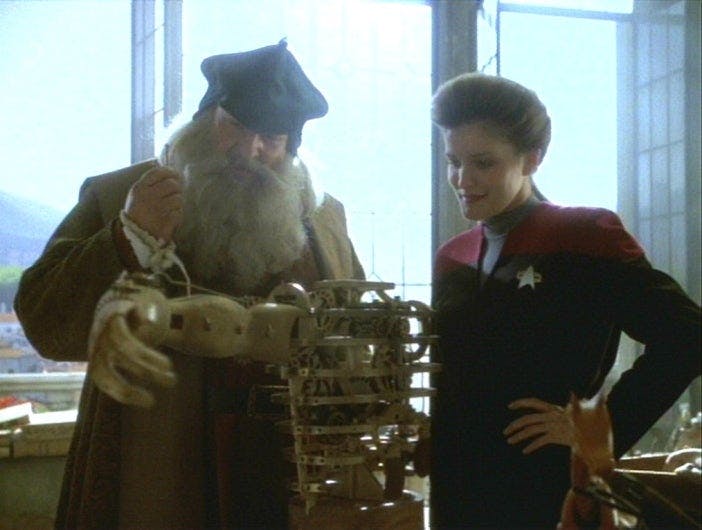
StarTrek.com
StarTrek.com: Have any helpful personal revelations resulted from the discussions you have envisioned?
Elowen Edwards: My most recent example has to do with the COVID-19 outbreak. I’m Dutch, but I live in Spain, and I’ve been largely confined to my home. At first, the uncertainty, the threat to public health, the way daily life was turned upside-down from one day to the next was frightening, but then I imagined what Sarek would say—not “the needs of the many outweigh the needs of the few” by the way, because I have several issues with that statement, the main issue being that ethics isn’t a simple mathematical equation—but it helped me to rationalize my situation.
StarTrek.com: What do you think Sarek would say to you about the uncertainty of the past few years?
Elowen Edwards: Something like, “It is logical to deal with one problem at a time as they present themselves, rather than be concerned about a future you cannot know and cannot control. And, considering that the only thing that is asked of you at the moment is to stay at home, with the guarantee you will not be short of any necessities, I would conclude you have not very much to be concerned about at all. Even if you did, it would not help you at all if you worried about it.”
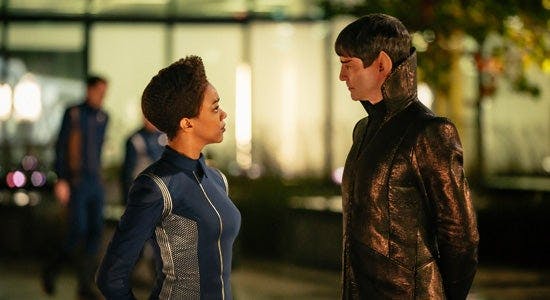
StarTrek.com
StarTrek.com: In the past, observing real-world injustices has left you feeling overwhelmed, isolated, sad, and frustrated. How has Star Trek aided you in processing those emotions?
Elowen Edwards:Star Trek has a place for all kinds of thinking and all kinds of beings. “Infinite diversity in infinite combinations” is, I believe, the key to solving many of the world’s problems. Star Trek gives us hope for a better future, but it also shows us the way of thinking that is necessary to reach that better future. If we do not look beyond our own community or national borders, if we don’t start seeing differences as opportunities to learn, if we don’t celebrate that diversity, if we don’t trust each other, if we keep seeing different ways of life as a threat to our own, if we don’t share our resources fairly and stop exploiting people and our environment—then we will never see a future like Star Trek.
At the moment, we’re going through dark and critical times in more than one way, but Star Trek tells us there’s light at the end of the tunnel. Yes, it’s still fiction, but considering how some things from The Original Series and onward have become reality, then there may be hope for the rest, and not just in the area of technological or scientific progress. I see it in a huge part of the online fan community. We support each other, we respect each other and we geek out together about all things Trek.
StarTrek.com: How has identifying with Vulcan logic and Betazoid empathy provided you with a greater understanding of yourself?
Elowen Edwards: What’s most appealing to me about the Vulcan way of life is their self-restraint and dedication to the truth, the way they embraced a form of pacifism after a violent history. I’ve always been anti-war myself—I guess that’s how I was raised too, but I remember being greatly affected by news about war as a child. I grew up in The Netherlands in the '80s and '90s, and WWII was still very prominent in our living memory back then. My grandparents lived through the German occupation. Plus the Cold War conflict in the former Yugoslavia, the first Gulf War... hearing about those events frightened and saddened me, even though I wasn’t personally experiencing them and at first too young to understand what was really going on.
I’ve never really believed in war as an unstoppable force of nature, as it’s often presented. I very much believe that war is a choice that can be avoided, and that it’s possible to achieve world peace. To imagine an alien race that has mostly eradicated violence from their society and replaced it with dedication to peace, truth, and reason is like a breath of fresh air and gives me hope. I think science fiction’s greatest strength isn’t necessarily to hold up a mirror to society, but to imagine alternatives to society and inspire us in our own lives.
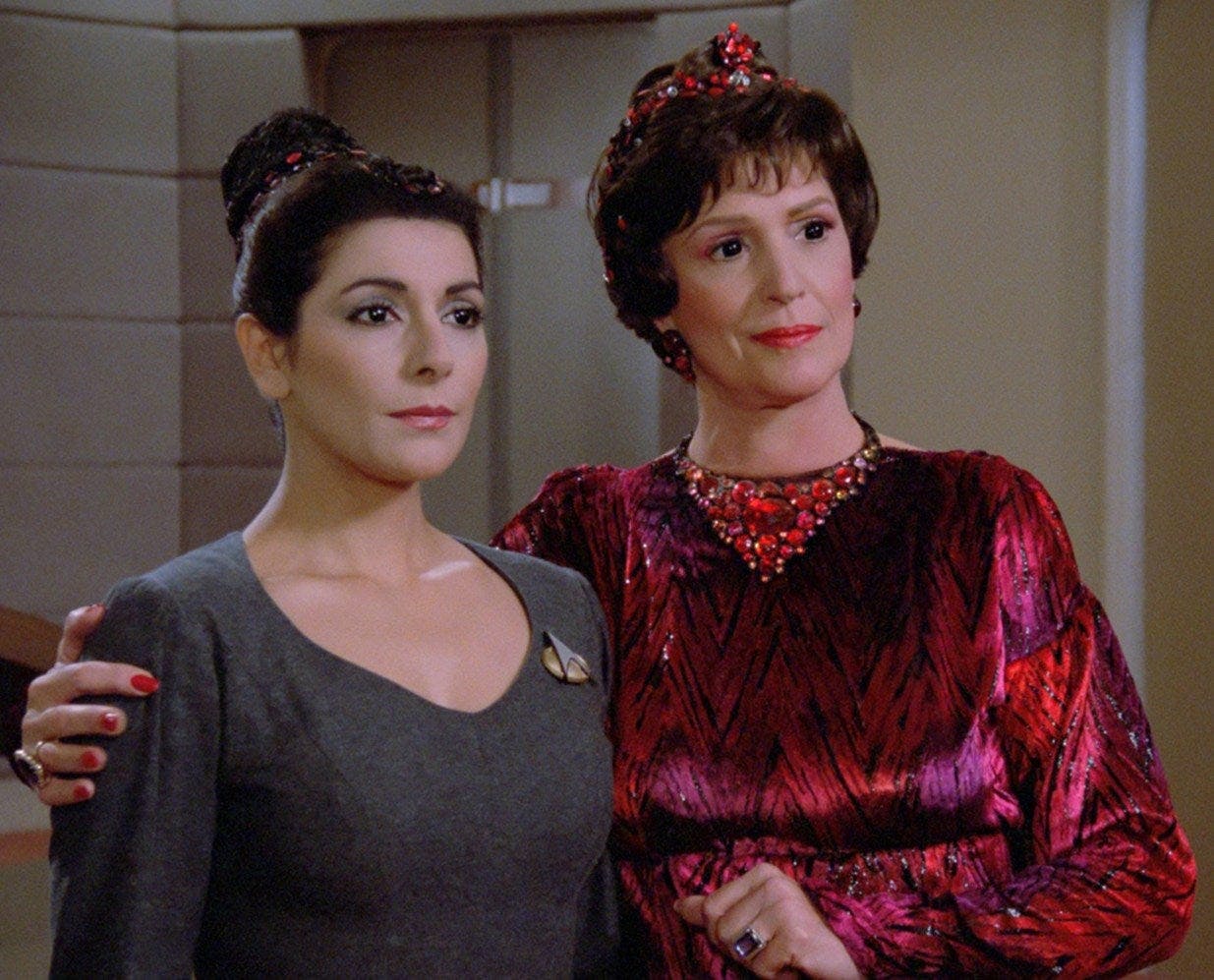
StarTrek.com
Obviously Vulcan isn’t perfect, and its insistence on tradition and rigidity doesn’t always seem the most logical option, so that’s when I turn to Betazed. Betazed is the embodiment of empathy, especially as demonstrated by Deanna Troi, and I think that empathy is our biggest weapon in our battle against violence, hatred, bigotry, and destruction. On a more personal level, Deanna Troi helped me to see that being empathetic isn’t a weakness, but a strength that enables people to build bridges. Reason and emotion are actually different sides of the same coin—without emotions we would be unable to make decisions, so to me Betazoids and Vulcans are completely compatible. I’m still waiting for a Star Trek character who embodies both cultures.
StarTrek.com: If you could visit a real Holodeck, who would you most like to meet in holographic form? Would it be a person from Star Trek, a historical figure, or someone else?
Elowen Edwards: Ursula Le Guin. I’m an aspiring fantasy and science-fiction novelist, and she’s my ultimate role model — for her vision and her beautiful, effortless writing. She also had a great sense of humor, so I think she would be great fun to hang out with.
I’d also like to join Janeway in her Leonardo da Vinci program. da Vinci was multi-passionate, the ultimate Renaissance man. I’m multi-passionate too, and also left-handed, like he was. My painting skills are lacking and I haven’t invented a flying machine, but I’m equally passionate about art, philosophy, history, and science. Janeway is one of my all-time favorite characters because of the leadership qualities she demonstrates and her humanity. Kate Mulgrew’s portrayal of her is iconic.
Jay Stobie (he/him) is a freelance writer who contributes articles to the official Star Trek website and Star Trek Magazine, as well as to Star Wars Insider and the official Star Wars website. Jay also serves as a part-time assistant and consultant advising many actors and creatives who work on his favorite sci-fi shows and films. He can be found on Twitter and Instagram at @StobiesGalaxy.
Star Trek: Discovery currently streams exclusively on Paramount+ in the U.S. Internationally, the series is available on Paramount+ in Australia, Latin America and the Nordics, and on Pluto TV in Austria, France, Germany, Italy, Spain, Switzerland and the United Kingdom on the Pluto TV Sci-Fi channel. In Canada, it airs on Bell Media’s CTV Sci-Fi Channel and streams on Crave. Star Trek: Discovery is distributed by Paramount Global Distribution Group.
Stay tuned to StarTrek.com for more details! And be sure to follow @StarTrek on Facebook, Twitter, and Instagram.

